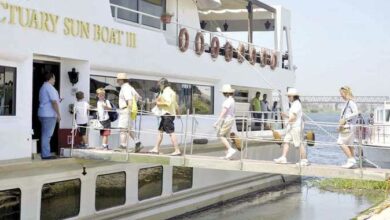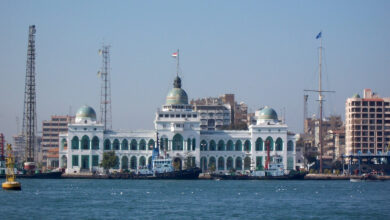London–Air travel across much of Europe was paralyzed for a fourth day on Sunday by a huge cloud of volcanic ash, but Dutch and German test flights carried out without apparent damage seemed to offer some hope of respite.
Dutch airline KLM said overnight inspection of an airliner after a test flight showed no damage to engines or other parts from ash in the atmosphere. Lufthansa also reported problem-free test flights, while Italian and French carriers announced they would be flying empty airliners on Sunday to assess conditions.
For the moment, a clampdown on flights across much of Europe was strictly maintained, posing a growing problem for businesses including airlines, estimated to be losing US$200 million a day, and thousands of travelers stranded worldwide.
Many countries closed their airspace until well into Sunday or Monday, and weather experts said wind patterns meant the cloud was not likely to move far until later in the week.
They said the dark grey plume rising from an Icelandic volcano and drifting southwards through the upper atmosphere could become more concentrated on Tuesday and Wednesday.
For some businesses dependent on the speed of air freight, the impact has been immediate.
Kenya’s flower exporters said they were already losing up to US$2 million a day because they had not been able to airlift their blooms. Kenya accounts for about a third of flower imports into the European Union.
Volcanic ash has an abrasive effect and can strip off vital aerodynamic surfaces and paralyze an aircraft engine. Aircraft avionics and electronics, as well as windshields, can also be damaged.
KLM, acting on a European Union request, flew a Boeing 737-800 without passengers at the regular altitude of 10 km (6 miles) and up to the 13 km maximum on Saturday. Germany’s Lufthansa said it flew 10 empty planes to Frankfurt from Munich at altitudes of up to 8 km.
“We have not found anything unusual and no irregularities, which indicates the atmosphere is clean and safe to fly,” said a spokeswoman for KLM, which is part of Air France-KLM.
German airline Air Berlin said it had also carried out test flights and expressed irritation at the shutdown of European air space.
“We are amazed that the results of the test flights done by Lufthansa and Air Berlin have not had any bearing on the decision-making of the air safety authorities,” Chief Executive Joachim Hunold said.
“The closure of the air space happened purely because of the data of a computer simulation at the Vulcanic Ash Advisory Center in London,” he told the mass circulation Bild am Sonntag paper.
The air travel disruption is the worst since the September 11 attacks on New York and Washington in 2001, when US airspace was closed for three days and European airlines were forced to halt all transatlantic services.
The cloud has forced several world leaders to rearrange travel plans. US President Barack Obama, German Chancellor Angela Merkel and others canceled trips to Poland for the funeral on Sunday of Polish President Lech Kaczynski, killed in a plane crash in Russia a week ago. Russian President Dmitry Medvedev went ahead with his flight to Krakow.
US-based forecaster AccuWeather said the ash was in an area of weak wind flow and was unlikely to move far on Monday.
“The plume is expected to become more concentrated Tuesday and Wednesday, posing a greater threat to air travel. However, it is also expected to become narrower, impacting a smaller area,” said AccuWeather.
It said an Atlantic storm and change in the direction of the jet stream on Thursday could break up the cloud.
Britain and Germany were among countries to declare their airspace closed late into Sunday. France was closing its last airports until Monday morning.
Economists say they stand by their models or predictions for European growth, hoping normal service can resume this week.
But in a worst-case scenario in which European airspace is closed for months, one economist estimated lost travel and tourism revenue alone could knock 1-2 percentage points off regional growth as long as it lasts. European growth had been predicted at 1-1.5 percent for 2010.
“That would mean a lot of European countries wouldn’t get any growth this year,” said Vanessa Rossi, senior economic fellow at Chatham House. “It would literally stifle the recovery. But the problem is it is incredibly hard to predict what will happen. Even the geologists can’t tell us.”
Airlines could suffer a severe financial blow.
British Airways, hit by strikes last month that cost it around US$70 million, canceled all Sunday’s flights.
Ireland’s Ryanair, Europe’s biggest low-cost carrier, has canceled all flights to and from northern European countries.
The fallout hit airline shares on Friday with Lufthansa, British Airways, Air Berlin, Air France-KLM, Iberia and Ryanair down between 1.4 and 3.0 percent.
Disruption spread to Asia, where dozens of Europe-bound flights were canceled and hotels from Beijing to Singapore strained to accommodate stranded passengers.
More than four in five flights by US airlines to and from Europe were canceled on Saturday. Shipping company FedEx Corp said more than 100 FedEx Express flights headed to Europe were rerouted, diverted or canceled within the past 72 hours.
The volcano began erupting on Wednesday for the second time in a month from below the Eyjafjallajokull glacier, hurling a plume of ash 6 to 11 km into the atmosphere.




